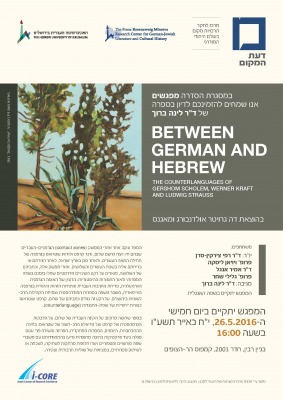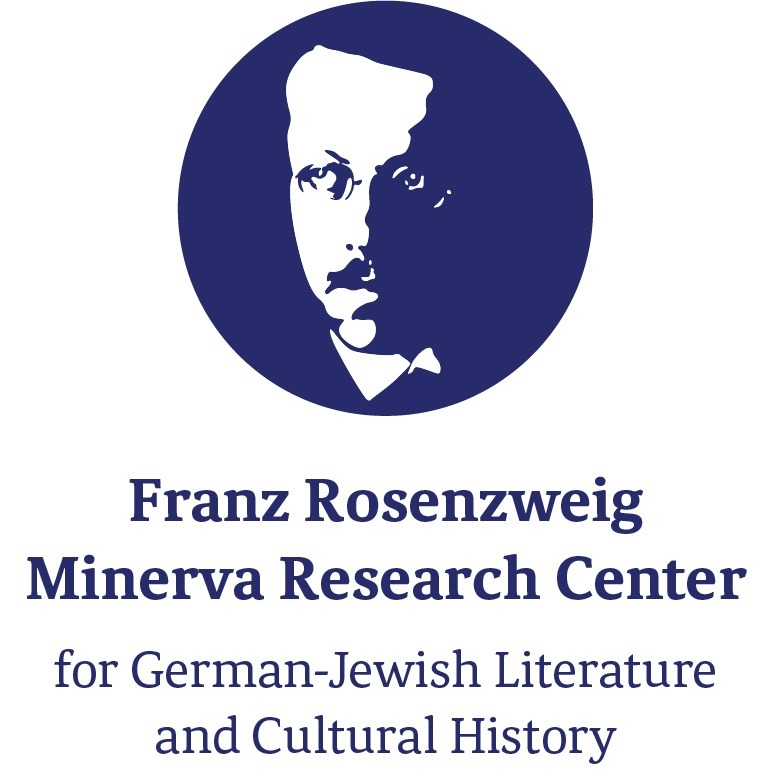
We are happy to invite you to a discussion on Lina Barouch's new publication: "Between German and Hebrew. The Counterlanguages of Gershom Scholem, Werner Kraft and Ludwig Strauss" (De Gruyter and Magnes Press).
Chair: Dr. Rafi Tsirkin-Sadan
Prof. Vivian Liska
Dr. Amir Engel
Prof. Galili Shahar
Commentator: Dr. Lina Barouch
The discussion will be held in English
Lina Barouch's book traces the German-Hebrew contact zones in which Gershom Scholem, Werner Kraft and Ludwig Strauss lived and produced their creative work in early twentieth-century Germany and later in British Mandate Palestine after their voluntary or forced migration in the 1920s and 1930s. Set in shifting historical contexts and literary debates – the notion of the German vernacular nation, Hebraism and Jewish Revival in Weimar Germany, the crisis of language in modernist literature, and the fledgling multilingual communities in Jerusalem, the writings of Scholem, Kraft and Strauss emerge as unique forms of counterlanguage. The three chapters of the book are dedicated to Scholem’s Hebraist lamentation, Kraft’s Germanist steadfastness and Strauss’s polyglot dialogue, respectively. The examination of their correspondences, diaries, scholarship and literary oeuvres demonstrates how counteractive writing practices helped confront concrete and metaphorical crises of language to produce compelling alternatives to literary silence, amnesia or paralysis that were prompted by cultural marginality and dislocation.
[taken from De Gruyter's website]
הספר עוקב אחר אזורי הממשק (contact zones) הגרמניים-העבריים שבהם חיו ויצרו גרשם שלום, ורנר קרפט ולודוויג שטראוס בגרמניה של תחילת המאה העשרים, ולאחר מכן בארץ ישראל, לאחר הגירתם או בריחתם אליה בשנות העשרים והשלושים. אזורי ממשק אלה, וכתביהם של השלושה, מוארים על רקע השינויים הדרמטיים שחלו בזמנם בשדה הספרותי ולאור התמורות ההיסטוריות: הרעיון של האומה הגרמנית הוורנקולרית, פריחת התרבות העברית והתחיות הזהות היהודית בגרמניה הוויימארית, משבר השפה בספרות המודרניסטית וצמיחת הקהילות הרב-לשוניות בירושלים. על רקע זה נגלים כתביהם של שלום, קרפט ושטראוס כצורות ייחודיות של שפת-התנגדות (counterlanguage).
בספר שלושה פרקים: על הקינה העברית של שלום, על הדבקות הגרמניסטית של קרפט ועל הדיאלוג הרב-לשוני של שטראוס. בחינת ההתכתבויות, היומנים, הספרות המחקרית, הפרוזה והשירה פרי עטם מגלה כיצד פרקטיקות כתיבה מתנגדות סייעו בהתמודדותם עם משברי שפה מוחשיים ומטפוריים ויצרו חלופות מרתקות לשתיקה, לשכחה או לשיתוק ספרותיים, במציאות של שוליות תרבותית ועקירה.

